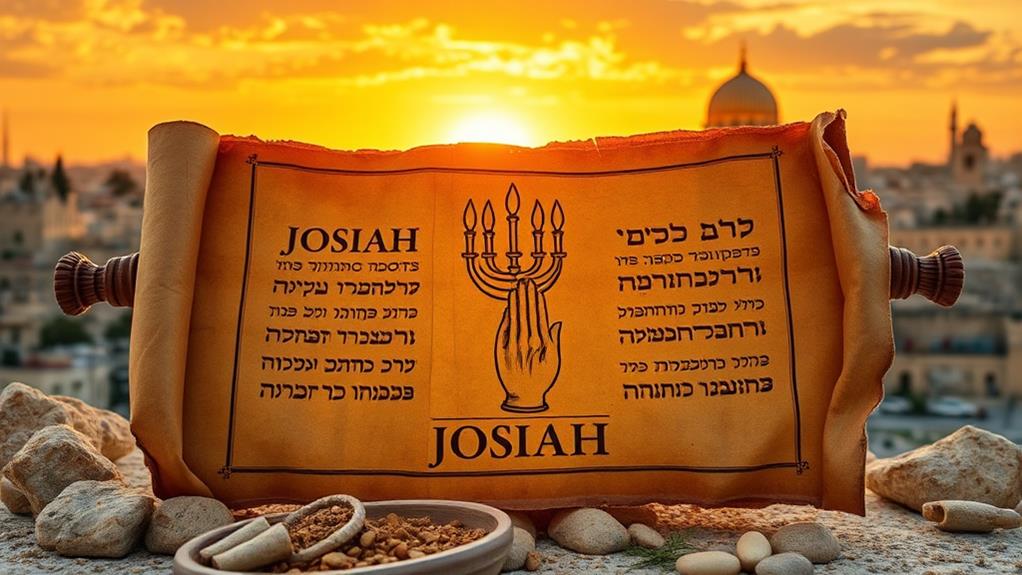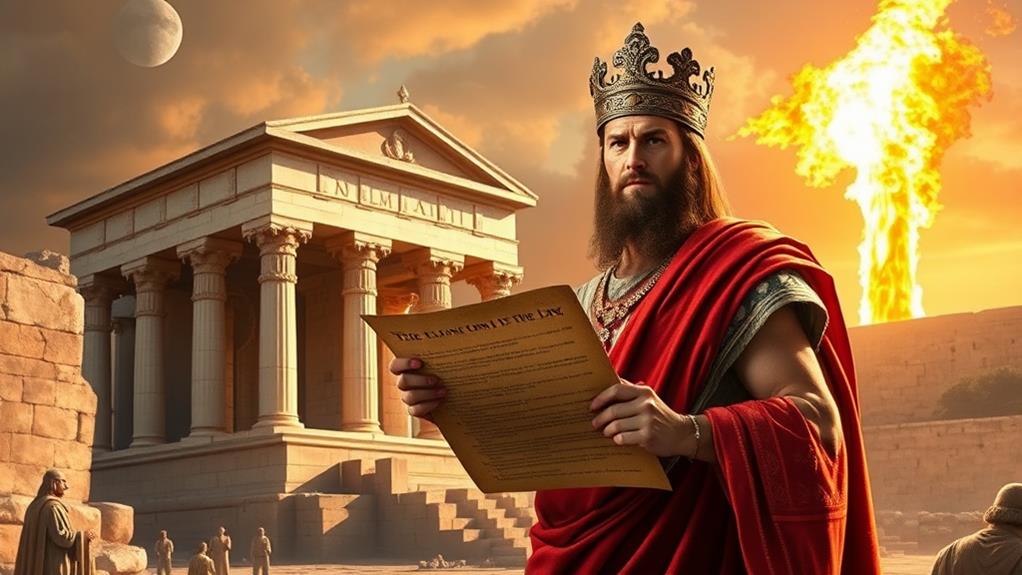Josiah Name Meaning in the Bible
The name Josiah, derived from the Hebrew Yoshiyahu, holds significant meaning in the Bible, symbolizing “Yahweh supports” or “God supports.” This name is prominently associated with King Josiah of Judah, who is celebrated for his extensive religious reforms and unwavering devotion to God. King Josiah’s reforms, which included restoring purity of worship and spiritual revival, underscored his commitment to God’s laws and demonstrated the transformative power of faithful leadership. His legacy serves as a beacon of spiritual integrity and moral excellence, inspiring generations to endeavor for similar righteousness. This profound biblical name embodies themes of divine support and guidance, offering a deeper exploration into the virtues of spiritual resilience and leadership.
Key Takeaways
- Biblical Meaning: Josiah is derived from the Hebrew name Yoshiyahu, meaning “Yahweh supports” or “God supports,” symbolizing divine support and guidance.
- Hebrew Etymology: The name Josiah consists of two elements: the first part derived from a verb meaning to support or heal, and the second part being “Yah” or “Yahu,” referring to God.
- King Josiah’s Significance: King Josiah’s reforms and devotion to God represent spiritual renewal and the importance of following divine laws, making his name synonymous with righteousness and obedience.
- Spiritual Themes: Josiah’s name and story emphasize themes of hope, healing, and spiritual resilience, reflecting his unwavering faith and commitment to God’s laws.
- Biblical Context: In the Bible, Josiah is remembered as a king who restored purity of worship and led spiritual revivals, making his name a symbol of spiritual integrity and moral excellence.
Biblical Origins of Josiah

What does the biblical name Josiah reveal about its origins? The name Josiah, rooted in Hebrew, is deeply intertwined with religious significance and cultural relevance. Derived from the Hebrew name Yoshiyahu, it combines “yoshi,” meaning “support,” and Yahu, a name for the Hebrew God, to convey the symbolic representation of “Yahweh supports” or “God supports”. This aligns with themes of spiritual freedom in Christ, emphasizing the importance of divine guidance and strength in one’s faith journey.
Biblically, Josiah is most prominently associated with King Josiah of Judah, known for his religious reforms and dedication to God. The king’s efforts to cleanse the temple and eradicate pagan worship underscore the name’s connection to spiritual renewal and devotion. In this perspective, Josiah symbolizes a commitment to faith and a desire to spread divine love.
The name’s etymology and biblical interpretation underscore its deep religious connotations, often perceived as having a strong evangelical Christian undertone in contemporary cultural perspectives. Despite these associations, the core meaning of Josiah remains a testament to the power of divine support and healing, making it a name that resonates with those seeking to instill faith and comforting support in their children.
Spiritual Significance in Scripture
The biblical figure of King Josiah embodies a profound spiritual significance within scripture, exemplified through his commitment to cleansing the temple and eradicating pagan worship. This effort reflects his deep understanding of biblical symbolism and his desire for spiritual transformation. Josiah’s actions, as recorded in 2 Kings 22 and 23, demonstrate his unwavering dedication to God’s law and his vision for a purified and reformed society. His reforms resonate with themes of humility and reliance on God, highlighting the importance of divine guidance in navigating challenges.
By destroying the centers of pagan worship and thoroughly cleansing the temple, Josiah aimed to restore the true worship of Yahweh and bring about a spiritual revival. This initiative illustrates the transformative power of faith and the importance of aligning with divine principles. Through his reforms, Josiah seeks to reconnect his people with their spiritual heritage and foster a deeper relationship with God.
Josiah’s story serves as a testament to the impact of fervent faith on societal and personal transformation. His commitment to spiritual renewal and his reliance on divine guidance make him a compelling figure in the biblical narrative, offering insights into the dynamics of faith, obedience, and cultural reform.
Etymology and Meaning Explained

Josiah, a Hebrew name, is composed of two distinct elements: *yoshi*, meaning “he supports” or “he heals,” and *Yahu*, which is a shortened form of Yahweh, the name of God in the Hebrew Bible. This combination gives the name Josiah its significant meaning, encapsulating the essence of divine support and healing. Like the name Evelyn, which symbolizes new beginnings and life renewal, Josiah also reflects themes of hope and the importance of divine guidance.
From a biblical symbolism perspective, the name Josiah is deeply rooted in the Old Testament. King Josiah, notable for his religious reforms and devotion to God, exemplifies the meaning of his name through his actions. His dedication to cleansing the temple and reviving the Passover celebrations highlights the prophetic and priestly dimensions of his name.
The etymology of Josiah is important in understanding its biblical significance. The possible derivations from the verbs *ya’ash* (to despair) and *’ashhh* (to support) underscore the complexities of interpreting Hebrew names. However, the consensus leans towards “Yahweh supports” or “Yahweh heals,” reflecting the transformative power of divine intervention in human life. This understanding encapsulates the spiritual essence of the name Josiah, reflecting the inherent desire for divine protection and healing.
Historical Figure of Josiah
King Josiah, a significant figure in the Old Scripture, is noted for his extensive reforms aimed at restoring the purity of worship in Judah. During his reign, he implemented a thorough cleanup of pagan worship centers, rebuilt the Temple in Jerusalem, and led the nation in a renewal of their covenant with God, as detailed in 2 Kings 22-23. His commitment to adhering to the law and promoting spiritual revival set him apart as one of the most righteous kings of Judah, earning him a unique place in biblical history.
Josiah’s leadership resonates with the qualities of strength and righteousness, akin to the symbolic virtues associated with names like Robert, which embody courage and wisdom symbolic alignment with virtues.
Reforms Under Josiah
A pivotal figure in the history of Judah, a young monarch, King Josiah, initiated a series of reforms that would have far-reaching consequences for the kingdom. Josiah’s reforms aimed to purify the religious practices of Judah, focusing on exclusive worship of Yahweh and eliminating idolatrous traditions. This religious revival led to significant changes in temple activities and feasts, embodying a return to the commandments of the Lord.
- Renovation of the Temple: Josiah ordered the restoration of the Temple, leading to the discovery of the “Book of the Law,” which guided his reforms.
- Elimination of Idolatrous Practices: He destroyed altars and images dedicated to Baal, Asherah, and other pagan deities throughout Judah and Jerusalem.
- Centralization of Worship: Josiah centralized worship in Jerusalem, abolishing local sanctuaries and high places.
- Restoration of Passover: He reinstated the Passover celebrations, which had been neglected for centuries.
- Purification of Priesthood: Josiah removed priests who had served at pagan altars and guaranteed that only those committed to Yahweh could serve at the Lord’s altar.
These reforms underscored Josiah’s dedication to social justice and religious purity, reflecting his heartfelt desire to obey the Lord’s laws and commandments.
Life of King Josiah
Rooted in religious fervor and a commitment to cleanse Judah of idolatrous practices, the life of the historical figure associated with the name Josiah is a demonstration of the transformative power of faith.
Josiah, who ascended to the throne at the tender age of eight after his father’s assassination, exemplified remarkable leadership qualities and devout adherence to the Law of the Lord. His reign, from approximately 640 to 609 B.C., was marked by a concerted effort to purge idols and restore the observance of God’s commands.
Under his guidance, the temple was renovated, leading to the rediscovery of the Book of the Law. This pivotal event stirred Josiah to herald a national repentance, calling for the people to pledge themselves to the covenant and adhere to God’s statutes.
His unwavering religious devotion led to the removal of high places, destruction of pagan altars, and the celebration of the Passover, signaling a profound revival in Judah’s spiritual life. Through his exemplary dedication, Josiah became one of Judah’s most revered kings, embodying the power of faith and commitment to divine guidance.
Josiah’s Historical Impact**
Setting off on a profound journey of spiritual transformation, Josiah’s reign left an indelible mark on Judah’s historical landscape. His reforms not only revitalized religious practices but also served as a model for future generations. Josiah’s commitment to God’s Law played a pivotal role in his efforts, guiding him to cleanse the temple and the land of idolatrous elements.
- Religious Revival: Josiah’s discovery of the Book of the Law led to a thorough spiritual renewal, with a focus on the strict adherence to God’s commandments.
- Political Influence: His leadership extended beyond Judah, influencing parts of the former kingdom of Israel and demonstrating the power of righteous governance.
- Temple Restoration: Josiah’s project to repair and restore the temple in Jerusalem symbolized a return to true worship and spiritual purity.
- Centralization of Worship: The abolition of local sanctuaries and the centralization of worship in Jerusalem underscored Josiah’s effort to unify the people under one God.
- Reform and Repentance: Josiah’s call for national repentance and his personal humility served as a powerful example of spiritual awakening and genuine faithfulness.
God’s Support and Healing

The biblical name Josiah carries profound meanings that underscore its significance in the Hebrew Bible. At its core, Josiah is derived from the Hebrew *Yoshiyahu*, which translates to “Yahweh supports” or “Yahweh heals”. This dual meaning reflects the deep connection between divine intervention and human resilience, emphasizing God’s role in providing both support and healing. The name underscores the importance of faith and courage, as it embodies the trust and reliance on divine power that characterized King Josiah’s reign.
King Josiah’s story in the Bible is marked by his courageous efforts to reform and purify the religious practices in Judah. His faith in God’s support and healing enabled him to undertake significant religious reforms, including the restoration of the Passover and the cleansing of the Temple. The name Josiah thereby symbolizes the transformative power of divine intervention, inspiring individuals to seek faith and trust in God’s guidance.
Through its rich etymology, the name Josiah conveys a powerful message of hope and redemption, resonating deeply with those who seek spiritual strength and guidance.
Reform and Prophecy Connection
King Josiah’s reign in ancient Judah is marked by significant reforms and a profound connection to prophetic guidance. Upon discovering the Book of the Law during a temple renovation, Josiah was deeply moved by its contents and sought the counsel of the prophetess Huldah, leading to a thorough renewal of Judah’s covenant with God and the cleansing of pagan worship.
This spiritual revival, however, did not prevent the ultimate fulfillment of divine judgment on Judah, underscoring the intricate interplay between prophecy and the actions of leaders in the biblical narrative.
Biblical King’s Impact
A pivotal figure in biblical history, Josiah’s impact on the religious landscape of Judah was profound, underscoring the intrinsic connection between reform and prophecy. His leadership influence spearheaded a significant religious revival, transforming the spiritual practices of his people. Following the discovery of the Book of the Law, Josiah initiated a thorough reform aimed at purifying the religious practices of Judah, highlighting his dedication to God.
Key aspects of Josiah’s impact include:
- Revival of Religious Practices: He cleansed the temple in Jerusalem, removed pagan altars, and re-established the Passover celebrations.
- Strengthening of Faith: Josiah’s reforms emphasized the importance of a genuine relationship with God, fostering a deeper spiritual connection among his people.
- Leadership by Example: Josiah’s personal devotion to God set a powerful example for his subjects, inspiring them to follow his lead.
- Prophetic Fulfillment: His reign was marked by the fulfillment of Huldah’s prophecy, securing his place as a significant figure in biblical prophecy.
- Legacy of Righteousness: Despite his tragic end, Josiah’s commitment to righteousness left a lasting legacy, influencing future generations in their pursuit of faithfulness.
Prophetic Reforms
Josiah’s profound impact on the religious practices of Judah was not just a reflection of his personal devotion but also a demonstration of how prophecy and reform are intricately linked. His prophetic leadership initiated a religious revival that aimed to purify worship and bring the nation back to the covenant with God. The discovery of the law, as described in 2 Kings 22:3-20 and 2 Chronicles 35:1-19, served as the catalyst for this reform.
Josiah’s reform efforts were guided by the prophetess Huldah and the prophet Jeremiah, emphasizing the integral role of prophecy in shaping his policies and actions. The reform consisted of eliminating pagan worship sites, removing idols from the temple, and reinstating the Passover feast to its former glory. This religious revival was a testament to Josiah’s faith in the prophetic message and his dedication to reclaiming Judah’s spiritual heritage.
Through his prophetic reforms, Josiah sought to make sure that the people of Judah would remain faithful to God and therefore avoid the impending judgment. His efforts, though marked by tragedy at Megiddo, served as a beacon of hope for future generations, illustrating the power of prophetic leadership and religious renewal.
Divine Judgment Connection**
The divine judgment connection that underpins Josiah’s reform efforts is an essential element in understanding the intricate link between prophecy and reform. Josiah’s extensive reforms were driven by the prophecy of the impending judgment day for Judah as foretold in the Book of the Law discovered during his reign. The prophecy, which spoke of divine justice and destruction for the sins of the people, motivated Josiah to rectify these wrongs and reinstitute the covenant with God.
- Renewal of the Covenant: Josiah gathered the people and renewed their covenant with God, emphasizing the importance of adherence to the divine law to avoid divine judgment.
- The Book of the Law: The discovery of this book revealed to Josiah the extent of their transgressions and the impending judgment day, prompting immediate action.
- Destruction of Idolatry: Josiah systematically destroyed idolatrous sites and practices, indicating a clear commitment to the path of divine justice.
- Celebration of the Passover: The grand celebration of the Passover under Josiah’s initiative was a significant attempt to align the people with divine teachings.
- Prophetic Guidance: The guidance of prophets like Jeremiah and Huldah underscored the urgency of reform to avoid the looming judgment.
Symbolic Legacy in the Bible**

While delving into the biblical narrative surrounding Josiah, it becomes evident that his symbolic heritage is deeply intertwined with themes of restoration and recommitment to divine law. As the king of Judah, Josiah’s symbolic guidance was instrumental in instigating a spiritual revival and cleansing of the temple. His unwavering dedication to the Lord and adherence to the Mosaic law not only purified the sacred space but also inspired a national renewal of faith\(\).
This significant transformation was the result of his profound spiritual influence, which resonated with the hearts of his people, encouraging them to return to the path of righteousness.
The symbolic significance of Josiah’s actions extends beyond his reign, serving as a demonstration of the power of righteous leadership and the importance of aligning human will with divine commandments. His heritage, as reflected in the biblical account, underscores the indelible impact of a leader who prioritizes spiritual integrity and the adherence to sacred laws, offering profound lessons in spiritual resilience and the pursuit of moral excellence.
Through his courageous reforms, Josiah became a beacon of hope and spiritual rectitude, his heritage echoing through the ages as a reminder of the transformative potential of faithful leadership.
Frequently Asked Questions
How Popular Is the Name Josiah Today?
The name Josiah currently ranks #53 in U.S. births, maintaining a steady rise in popularity due to its historical significance and strong moral connotations. It stands out as a masculine name embodying both strength and integrity.
Is Josiah Used as a Girl’s Name?
While traditionally a masculine Hebrew name, Josiah’s usage as a girl’s name is unconventional and not commonly practiced. Its historical significance and biblical origins, tied to King Josiah of Judah, firmly root it in masculine naming traditions.
What Nicknames Are Common for Josiah?
Common nicknames for Josiah include Jo, JoJo, Joe, Jed, and Siah, each offering unique variations. These nicknames reflect both modern and traditional uses, echoing the historical significance of a name that has remained versatile over centuries.
Are There Variations of the Name Josiah?
Variations of the name Josiah include Josias, Yoshiyahu, and Yosiya, reflecting its Hebrew origin and biblical significance. Regional popularity has led to diverse spellings and adaptations, such as Josiah, Josias, and Osiah, across different cultures and languages.
What Cultural Colors Are Associated With the Name Josiah?
Coincidentally, the vibrant hues of orange and bright yellow are often linked with the name Josiah, symbolizing joy, creativity, and optimism. In cultural and biblical contexts, these colors represent the warmth and illumination that Josiah embodies.
Unique Female Figures in the Bible
- Jael Name Meaning in the Bible
- Josiah Name Meaning in the Bible
- Kiara Name Meaning in the Bible
- Zemirah Name Meaning in the Bible
- Zaiah Name Meaning in the Bible
Conclusion
In the tapestry of biblical history, Josiah’s name embodies the dual themes of divine support and healing, reflecting the Hebrew etymology of “Yahweh supports” and “whom Jehovah heals.” Through his reform and prophecy, Josiah’s legacy transcends time, symbolizing the promise of renewal and covenantal commitment. Like the unquenchable flame that fueled his spiritual fervor, Josiah’s name ignites a beacon of hope, illuminating the path of righteousness and faithfulness in the annals of Scripture. “Lux in Tenebris”—light in the darkness—a tribute to the enduring power of his biblical heritage.






